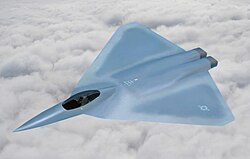✈️ Bell X-44 MANTA (Multi-Axis No-Tail Aircraft) — Review
🧩 Overview
The X-44 MANTA was a joint concept study by Lockheed Martin, NASA, and the U.S. Air Force in the late 1990s. It was designed as a tailless evolution of the F-22 Raptor, with the aim of exploring full thrust vectoring for flight control — no vertical or horizontal stabilizers at all.
Though it never made it past the planning phase, the X-44 was a powerful indicator of where stealth aviation and next-gen maneuvering were headed.
⚙️ Key Concept Specs
-
Status: Design/concept only (never built or flown)
-
Intended role: Air superiority, stealth fighter
-
Derived from: F-22 Raptor airframe
-
Configuration:
-
No tail (no rudder, elevators, or vertical stabilizers)
-
Delta wing with full-span elevons
-
3D thrust vectoring used for all flight control
-
-
Engines: 2 × Pratt & Whitney F119 (same as F-22)
-
Weapons: Internally carried air-to-air missiles, just like the F-22
-
Avionics: Proposed to use upgraded or experimental stealth radar systems
🛠 Design Features
-
Tailless delta-wing layout: Extremely stealthy, with fewer radar-reflective surfaces
-
Thrust vectoring-only flight control: Used jet nozzle movement to pitch, roll, and yaw
-
F-22 base: The aircraft would have used the F-22’s fuselage and internal systems, but heavily modified
-
Optimized for stealth and supersonic cruise
-
High fuel capacity: Delta wing allowed for more internal fuel storage and longer range
🧱 Strengths
-
✅ Unmatched stealth: Fewer control surfaces = lower radar signature
-
✅ Advanced agility: Thrust vectoring provided high maneuverability
-
✅ Innovative control system: Pure nozzle-based flight control
-
✅ High range potential: With more internal fuel space
-
✅ Influential design: Helped inform sixth-generation fighter research
⚠️ Weaknesses / Challenges
-
❌ Never built or tested: Only studied in simulation and concept models
-
❌ High control complexity: Required extremely advanced fly-by-wire systems
-
❌ High cost & risk: Too radical for the early 2000s defense budget
-
❌ Program ended quietly in favor of the proven F-22 and development of what would become the F-35
🏁 Final Verdict
| Category | Rating (★ out of 5) |
|---|---|
| Innovation | ★★★★★ |
| Stealth Potential | ★★★★★ |
| Maneuverability | ★★★★☆ |
| Real-World Impact | ★★☆☆☆ |
| Cool Factor | ★★★★★ |
🔚 Final Thoughts
The X-44 MANTA never flew, but it may have been decades ahead of its time. Its tailless design, full thrust-vectoring control, and stealth-first philosophy have influenced current concepts like the NGAD (Next Generation Air Dominance) program and even unmanned stealth drones.
In many ways, the X-44 represents what could be the future of air combat: a sleek, radar-evading jet with no traditional control surfaces — and unmatched agility.

Comments are closed